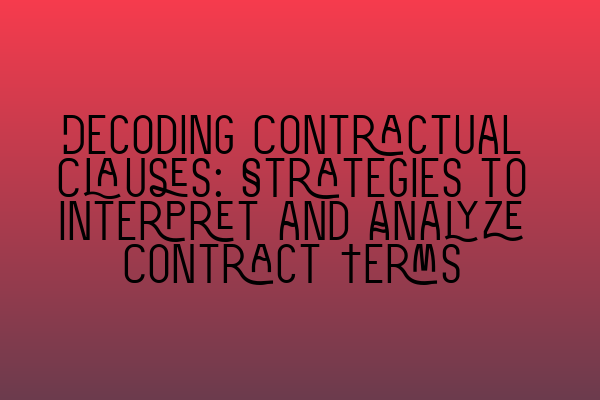Decoding Contractual Clauses: Strategies to Interpret and Analyze Contract Terms
Contracts are the backbone of business transactions and legal agreements. They set out the rights and obligations of the parties involved and provide clarity and certainty in commercial relationships. However, contracts can often be complex and filled with legal jargon, making it challenging for individuals to fully understand the terms and interpret their implications.
In this article, we will discuss effective strategies to help you decode contractual clauses and analyze contract terms. By understanding the key principles and techniques, you can ensure that you are making informed decisions and protecting your interests.
1. Start with the Basics: Read Carefully and Identify Key Terms
When presented with a contract, the first step is to read it carefully. Pay close attention to every clause and identify the key terms. These terms are crucial as they define the rights and obligations of each party. Look for definitions sections, which provide meanings for specific words or phrases used throughout the contract.
Once you have identified the key terms, create a glossary of definitions for easy reference. This will help you navigate the contract and ensure you have a clear understanding of its provisions.
2. Analyze the Context and Purpose of the Contract
Contracts are not created in a vacuum. They are drafted to serve a specific purpose and are influenced by the context in which they are created. To decipher the intended meaning of a contract, it is essential to understand the context and purpose behind it.
Consider the circumstances that led to the contract’s formation, the relationship between the parties, and the industry in which they operate. This broader understanding will provide valuable insights into the intentions of the parties and help you interpret the contract’s provisions in the right context.
3. Apply the Principles of Contract Interpretation
Contract interpretation relies on established legal principles that guide courts in determining the meaning of contractual clauses. By applying these principles, you can decode and analyze contract terms more effectively.
Some key principles include:
- The Principle of Contra Proferentem: This principle holds that any ambiguity in a contract should be interpreted against the party who drafted it. It places the burden on the drafter to ensure clarity in the contract’s language.
- The Objective Intent Rule: This rule requires courts to interpret contracts based on the reasonable objective intentions of the parties. It focuses on what a reasonable person would understand from the contract, rather than the subjective intentions of the parties.
- The Parol Evidence Rule: This rule restricts the admission of extrinsic evidence (oral or written statements made outside the contract) to interpret or contradict the terms of a written contract. It promotes the finality and certainty of written agreements.
By familiarizing yourself with these principles, you can leverage them to interpret and analyze contractual clauses with greater accuracy.
4. Seek Professional Advice
While it’s helpful to have a basic understanding of contract interpretation, deciphering complex contractual clauses can be a daunting task. If you are unsure about certain provisions or need expert guidance, it is advisable to seek professional advice from a qualified solicitor.
A solicitor with expertise in contract law can analyze the terms and implications of a contract, provide clarity on any ambiguous clauses, and advise you on the best course of action. Their expertise can help you avoid potential pitfalls and ensure your rights and interests are protected.
If you are an aspiring solicitor looking for mentorship or guidance in the legal field, consider reading our related article on Mentorship for Aspiring Solicitors: Nurturing Talent in the Legal Field to learn more.
Conclusion
Decoding contractual clauses is a skill that requires careful reading, analysis, and an understanding of legal principles. By starting with the basics, analyzing the context, applying relevant principles, and seeking professional advice when necessary, you can navigate complex contracts with confidence and make informed decisions.
For more information on navigating the legal system and the journey to becoming a solicitor, we recommend reading these related articles:
